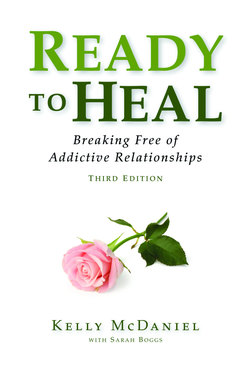Читать книгу Ready to Heal: Breaking Free of Addictive Relationships - Sarah Elisabeth Boggs - Страница 10
На сайте Литреса книга снята с продажи.
Are You a Love or Sex Addict?
ОглавлениеWhen a certain person or behavior rules your thoughts and time, and you can’t seem to control the obsession, you may be caught in an addiction. Addiction, sometimes referred to as a compulsion, takes over your rational choices. You may find yourself doing things that don’t make sense. Despite negative results, you continue this behavior. Even when you resolve to stop, you can’t. The following list of compulsive behaviors may help you identify and relate to some of the symptoms of love and sex addiction:
•secretly checking a partner’s email
•craving a “buzz” or a fix from romance or sex
•believing the fantasy that “someday my prince will come”
•cruising Facebook to find out about an “ex” or current partner
•checking a partner’s alcohol use, drug intake, and so on
•using porn to avoid relationships; having sex secretly
•changing jobs to follow a partner without a mutual decision or commitment
•checking out women or men in public, or looking to see who your partner will find attractive
•changing the way you dress or wear makeup to please a partner
•changing friends and hobbies to please a partner
•checking a partner’s cell phone without permission
•trying to figure out what your partner is thinking
•obsessing about where and what your partner is doing
•following your partner to find out what is happening
•participating in sexual activities you find uncomfortable to please your partner
•neglecting self-care while in a relationship with your partner
•searching for sexual attention outside a primary relationship (including Internet activity of an emotional or sexual nature)
•compulsively using food, money, alcohol, drugs, and/or sex
After reviewing the list above, you may choose to take the 40 Questions for Self-Diagnosis on the Sex and Love Addicts Anonymous website, www.sla.org. By exploring the possibility of having an addiction, you may be feeling shame, pain, or fear as you read the stories of the women presented in this book. Be gentle with yourself. You’ve been navigating a narrow tunnel in search of happiness and intimacy—not an easy path. If along the way you’ve gotten lost or stumbled into addictive patterns, you’re not alone. Many women have difficulty with the concept that their sexual behavior could be addictive. This is understandable. Sex addiction is typically assigned to men. And the media tends to sensationalize images of male sex addicts, making the addiction seem scary, scandalous, and perverted. For these reasons, “love” addiction might be a better term to use than “sex” addiction. Yet, the brain doesn’t distinguish between love and sex. Both provide an immediate rush of hormones that feel great. The distinction between the two is more cultural.
Naming this behavior is problematic for professionals too. Therapists and authors have difficulty defining an addiction to sex and love with uniformity. There is resistance to the notion that love or sex could become addictive. In a culture “in love” with love, it’s understandable that this is an unpopular idea. The mood-altering experience of falling in love feels wonderful. In the early stage with a new partner, euphoria creates energy and warmth. Sexual arousal is intense. How could these fantastic feelings be a problem or an addiction? Can too much of a good thing be bad? Christine McVie of Fleetwood Mac crooned about how nice it felt to be “Over My Head” while Diana Ross told us about her “Love Hangover”! However, there can come a point when the craving for love and sex becomes addictive.
See if you can relate to the following criteria of addiction:
•loss of time with family members, hobbies, and friends
•an experience of being “high” followed by secrecy and shame
•negative consequences (which may include health problems and financial problems)
•obsessive preoccupation with the relationship or sex
•attempts to stop your behavior (or obsession) fail and bring considerable irritability and distress
•your behavior becomes riskier or more intense
If love or sex has become a drug for you, you’re in a painful paradox. You have a valid need for connection and intimacy that has been twisted into addiction. No one chooses this addiction. Again, painful romantic patterns have their roots in early abuse experiences and damaging cultural beliefs. Addiction is an attempt to survive loneliness, soothe neglect, and find comfort. Therefore, understanding love and sex addiction can’t be separated from understanding infant development, childhood trauma, and cultural stereotypes. The shame that goes along with compulsive sexual behavior is lifted with understanding, freeing your spirit for the important work of healing. Ready to Heal will explore the origins of this painful addiction and offer a pathway out of despair into joy and healing.
